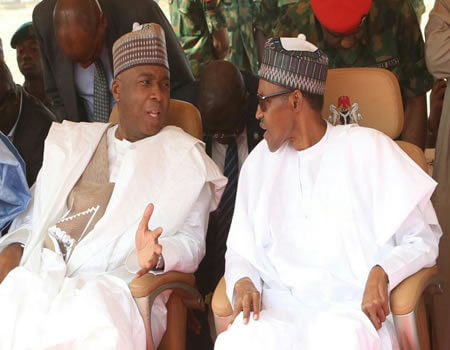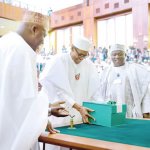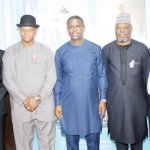SENATE President, Dr Bukola Saraki, told President Muhammadu Buhari on Wednesday that there is hunger and hardship in the land, adding that the executive and the legislature need to buckle up and work out solutions.
The Senate President, in a speech at the joint session of the National Assembly to receive the 2017 budget, said the feedback from constituents of the legislatures showed that poverty was ravaging the people.
He said that while the leaders could not perform magic, they must continue to work round the clock to find solutions.
Saraki said: “Mr President, the feedback we get from visits to our various constituencies is that there is hardship in the land. We can see it and we can feel it. This situation, therefore, commands all of us as government to a greater sense of urgency. We cannot work magic, but we must continue to work the clock.”
He said the Nigerian people would only appreciate concerted efforts by the leaders to solve the growing economic problems, adding that the people were not concerned about the different political affiliations of the leaders.
He said: “Our people must see that the singular pre-occupation of government is the search for solution to the current economic hardship and the commitment to ease their burden. They don’t want to know what political parties we belong, what language we speak or how we worship God.
“They have entrusted their fate into our hands and they need us now more than ever, to justify the trust that they have reposed in us. The people of Nigeria will pardon us if we do some things wrong, but they will not forgive us if we do nothing.”
He said as a result of the concern by the legislature, the National Assembly had, in August, inaugurated a technical committee to take a look at the budgetary process and fine-tune it.
He said the lawmakers were resolved that “whatever may be our differences or opinions on issues of the economy, we will all work with one common purpose for this reason.”
He also told the president to expect that the National Assembly would tinker with the document he submitted, adding that notwithstanding the level of work done by the executive on the budget, it remainsed estimates.
“Mr President, though we are confident that we are receiving from you a very well-articulated budget proposal, it is worthy to point out that the best produced budget from the executive at all times still remains a proposal according to our constitution which the National Assembly will assiduously work on,” Saraki said.
He said the National Assembly’s initiative to ease the budgetary process led to the inauguration of the Executive/Legislative committee on the review of budget systems, adding that the effort had yielded some key steps already adopted within the 2016 budget season.
He highlighted the steps to include pre-budget consultation and engagement; greater information sharing and recording; public hearing on the budget bill; drafting of an Organic Budget Bill and Amendment of the Public Procurement Act.
He also stated that the remaining steps would be captured within the 2017 budget season.
The Senate President also emphasised the need to promote Made-in-Nigeria products, adding that the public sector needed to collaborate with the private sector to get Nigeria out of economic recession.
The Senate President said: “Mr President, you will recall in 2015, I made a clarion call while receiving Your Excellency’s budget presentation for that year that the 2016 budget needed to be bold and pragmatic to drive local production and promote Made-in-Nigeria goods.
“Today, permit me Your Excellency to reiterate this call. The only way we can cut down on our foreign exchange needs, create jobs and stimulate entrepreneurship in the country is to promote local manufacturing and investments.
“This is why the National Assembly injected the Made-in-Nigeria amendment into the Public Procurement Act. We are expectant that with your leadership, Mr President, we will achieve even much more in this area. It is the hope of the National Assembly that the 2017 budget will continue to proactively pursue this policy objective.”






